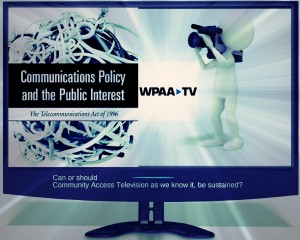Congress attempted to review what stays, goes or may be modified in the Telecom Act of 1996. In an Internet connected world, can or should Community Access Television as we know it, be sustained? As with so many things before Congress there was inaction.
If the Internet is ubiquitous and free to all in the near future, will the following personal aspects of local television still be desirable?
- Comfortable watching of content from a living room recliner;
- Same viewing experience shared by neighbors;
- Community projects bringing folks together to tell community stories;
- Commercial‐free viewing;
- Local media that is not controlled by media corporations, self‐appointed power brokers or self‐interested corporations
Community Access is the delivery system for hyperlocal content: content important to the shut‐in who cannot attend church, commuter who cannot attend a public meeting, a child proud of their report shared with everyone in town, immigrants learning a new language, new homeowner learning about his/her community. It is people agreeing and disagreeing about what makes a difference to them locally where they still have the potential to influence outcomes.
Yes, the Internet should change Community Access TV by being another tool for delivery. What it cannot be or replace is the potential to gather, teach, discuss and share what is local based on the reasonable needs and qualities of a community. Hundreds of volunteers and organizations are connected through a viable Community Media System. Youth can discover, learn and experiment; and elders can stay connected in what would hopefully be a community hub that is more vital today because what can be created as TV can be shared as Social Media and distributed additionally via the Internet. Locally WPAA-TV and Community Media Center is prepared to be that hub.

